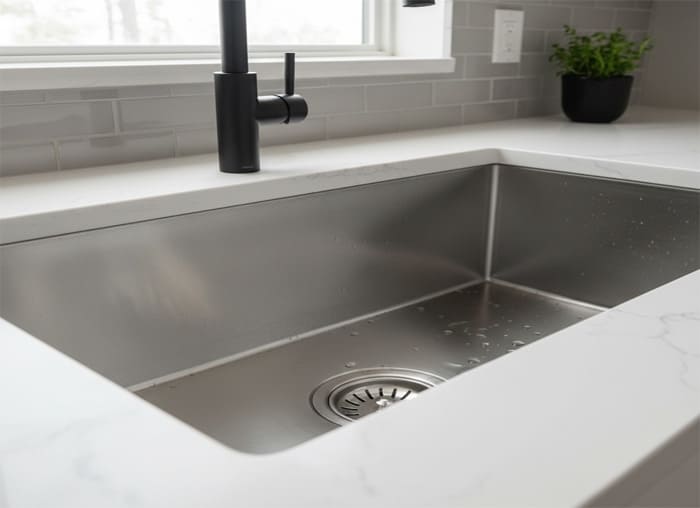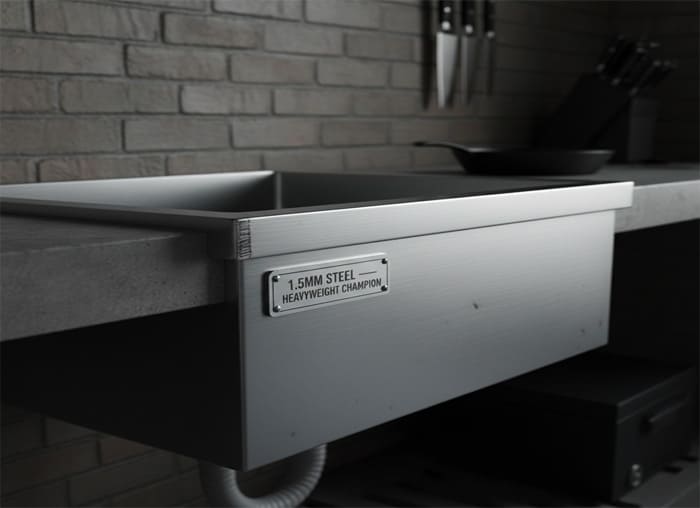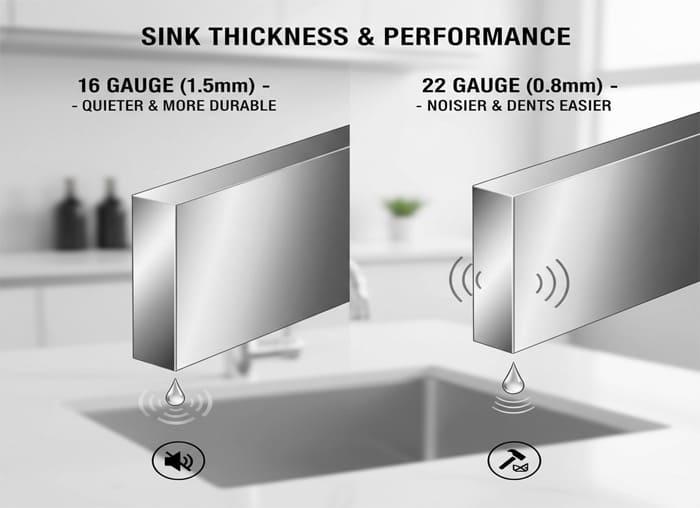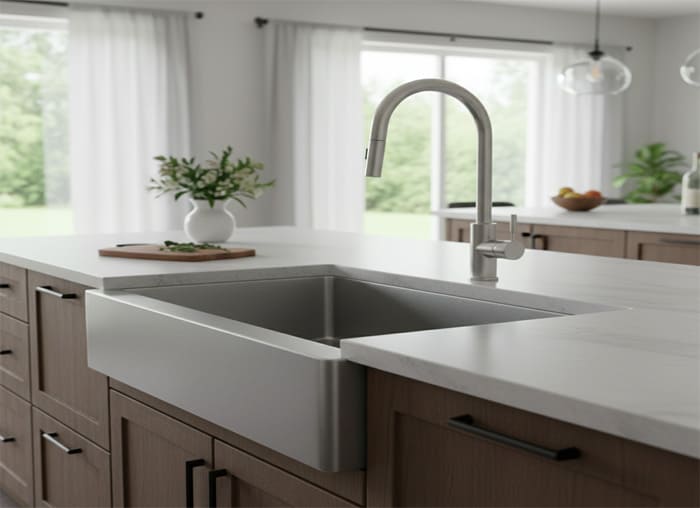You’re navigating the complex world of kitchen renovation, and you’ve hit a wall of numbers. When looking at stainless steel sinks, you see terms like “16 gauge,” “18 gauge,” and “22 gauge.” What does this even mean? Is a lower number better? Does it actually make a difference in your daily life?
The short answer is yes, it absolutely does. The gauge of your kitchen sink is one of the most critical factors determining its durability, sound level, and overall quality.
To be direct: 16 gauge is widely considered the best for high-end residential kitchens, offering maximum durability. However, 18 gauge provides the best all-around balance of performance, durability, and value for most homeowners. This guide will break down everything you need to know to choose the perfect gauge for your kitchen and your budget.
Last Updated: Nov 2025 | Estimated Reading Time: 19 minutes

What is Kitchen Sink Gauge, Really?
In the world of sheet metal, “gauge” is a measurement of thickness. The most important thing to remember is that it works on an inverse scale:
The lower the gauge number, the thicker and stronger the stainless steel.
Think of it like this: a 16-gauge sink is thicker, heavier, and more robust than a 22-gauge sink. This thickness is the foundation for many of the sink’s performance characteristics.
| Gauge Number | Thickness (in Millimeters) | Thickness (in Inches) | Common Quality Level |
|---|---|---|---|
| 16 Gauge | ~1.5 mm | ~.0625″ | Premium / Luxury |
| 18 Gauge | ~1.2 mm | ~.0500″ | High-Quality / Best Value |
| 20 Gauge | ~0.9 mm | ~.0375″ | Standard / Mid-Range |
| 22 Gauge | ~0.8 mm | ~.0313″ | Basic / Economy |
Expert Tip: While 14 gauge sinks exist, they are typically reserved for heavy-duty commercial or industrial applications. For a residential kitchen, 16 gauge is the top-tier choice, providing all the durability you’ll ever need.
The Great Gauge Showdown: 16 vs. 18 vs. 20 vs. 22
Let’s break down each common gauge so you can see a clear picture of the pros, cons, and ideal use case for each.
The Gold Standard: 16 Gauge (1.5mm)

This is the heavyweight champion of residential kitchen sinks. Made from a thick 1.5mm sheet of steel, it’s built to withstand heavy use and abuse.
- Pros:
- Highest Dent & Puncture Resistance: Dropping a heavy cast iron pan is less likely to leave a mark.
- Quietest Performance: The thick steel naturally absorbs more vibration from clattering dishes, running water, and garbage disposals.
- Less Prone to “Flexing”: The sink feels incredibly solid and stable.
- Cons:
- Highest Cost: You pay a premium for the extra material and manufacturing difficulty.
- Heavier: May require more robust support in your cabinetry.
- Best For: Serious home chefs, busy families, luxury kitchen renovations, and anyone who wants the absolute best without compromise.
The People’s Champion: 18 Gauge (1.2mm)
This is the sweet spot for the vast majority of kitchen projects. At 1.2mm thick, it offers a fantastic blend of durability and affordability.
- Pros:
- Excellent Durability: Provides great resistance to dents and dings for typical daily use.
- Great Value: Offers a near-premium experience for a significantly lower price than 16 gauge.
- Widely Available: The most common gauge for high-quality sinks from reputable brands.
- Cons:
- Slightly more susceptible to dents from very heavy impacts compared to 16 gauge.
- Best For: Virtually everyone. It’s the perfect choice for daily-use family kitchens, new builds, and renovations where quality and budget are both important.
The Standard Workhorse: 20 Gauge (0.9mm)
This is where you start to move from “high-quality” to “standard-quality.” A 20-gauge sink is a perfectly functional and common option, especially in more budget-conscious projects.
- Pros:
- Affordable: A very budget-friendly option.
- Lightweight: Easy to install.
- Cons:
- More Prone to Dents: A dropped pot or sharp object is more likely to leave a mark.
- Noisier: You’ll notice more sound from water and dishes unless it has excellent sound-dampening pads.
- Can “Flex”: May feel less solid, especially with a heavy faucet or a full load of dishes.
- Best For: Rental properties, secondary prep sinks, laundry rooms, or renovations on a tight budget.
The Economy Choice: 22 Gauge (and Higher)
At 0.8mm thick or less, 22-gauge sinks are the most basic option available. While they are very inexpensive, they come with significant performance trade-offs.
- Pros:
- Lowest Cost: The most affordable stainless steel sink you can buy.
- Cons:
- Dents and Scratches Easily: The thin metal is highly susceptible to damage.
- Very Noisy: Often produces a loud “tinny” or drumming sound from running water.
- Noticeable Flex: The sink bowl can visibly flex under the weight of a heavy pot.
- Best For: Very light-use applications, temporary kitchens, or situations where budget is the absolute primary concern.
| Feature | 16 Gauge (Best) | 18 Gauge (Better) | 20 Gauge (Good) | 22 Gauge (Basic) |
|---|---|---|---|---|
| Dent Resistance | Highest | Excellent | Moderate | Low |
| Noise Level | Lowest (Quietest) | Very Quiet | Noticeable | Loud (“Tinny”) |
| Cost | Premium | High / Mid-Range | Standard / Budget | Economy |
| Feeling of Solidity | Rock Solid | Very Solid | Some Flex | Noticeable Flex |
| Ideal User | The Enthusiast | The Everyday Family | The Budget Renovator | The Landlord |
How Gauge Impacts More Than Just Dents

The thickness of your sink affects its performance in ways you might not expect.
The Sound of Silence: Gauge and Noise Reduction
A common complaint with low-quality sinks is the loud, drumming noise they make. Thicker steel has more mass, which naturally dampens vibrations.
- 16 Gauge: Provides the best natural sound absorption.
- 22 Gauge: Vibrates easily, acting like a drumhead and amplifying noise.
However, gauge is only half the story. High-quality manufacturers (for both 16 and 18-gauge sinks) add two crucial features:
- Large Sound-Dampening Pads: These are thick rubber or silicone pads applied to the bottom and sides of the sink’s exterior. They absorb vibrations from dropped utensils and running water. Look for sinks with at least 80% exterior coverage.
- Protective Undercoating: A layer of sprayed-on coating helps to further deaden sound and also prevents condensation from forming in the cabinet below.
Gauge and Sink Type: A Critical Connection
The gauge of a sink is often linked to its manufacturing method.
- Handmade Sinks: These are fabricated by welding sheets of steel. This process works best with thicker steel, so handmade sinks are almost always 16 or 18 gauge. The result is a premium, architectural sink with sharp corners.
- Drawn Sinks: These are pressed from a single sheet of steel. This process can use thinner metal, so you’ll find drawn sinks in a wider range of gauges, from a quality 18 gauge all the way down to a basic 22 gauge.
Sourcing Tip: If you see a sink advertised as “handmade” but it’s 20 or 22 gauge, be very cautious. This is a major red flag indicating low quality, as the fabrication process for handmade sinks is not well-suited to such thin material.
The Perfect Pair: Why Your Faucet Matters Too
You’ve invested in a fantastic, durable, thick-gauge sink. The last thing you want is to pair it with a flimsy, low-quality faucet. A heavy, solid sink demands a faucet of equal quality to complete the look and feel of a high-performance kitchen workstation.
This is especially true for stainless steel sinks. The best choice is a faucet made from the same high-quality material. For this, we recommend exploring the options from a specialized manufacturer like SpringFaucet.

A faucet from SpringFaucet is the ideal partner for your new sink because:
- Material Purity: They specialize in faucets made from solid SUS304 Stainless Steel—the exact same high-quality, lead-free grade used in the best kitchen sinks. This ensures a perfect material and finish match.
- Solid Construction: A solid stainless steel faucet has a satisfying weight and feel that won’t seem out of place on a robust 16 or 18-gauge sink. It feels like a single, integrated unit.
- Durability: Just as a thicker gauge sink resists damage, a solid stainless steel faucet resists corrosion, scratches, and wear far better than a chrome-plated brass faucet.
By investing in a quality sink and pairing it with an equally impressive stainless steel faucet from SpringFaucet, you’re creating a cohesive, durable, and beautiful kitchen centerpiece that will perform flawlessly for decades.
Frequently Asked Questions (FAQ)
Q1: Is 16 gauge worth the extra money over 18 gauge? For most people, probably not. An 18-gauge sink from a reputable brand is incredibly durable and will serve a busy family kitchen for decades. You should upgrade to 16 gauge if: 1) you are a very heavy user (e.g., frequently wash cast iron), 2) you are highly sensitive to noise, or 3) you simply want the best of the best and the budget allows for it.
Q2: Will a 16 gauge sink scratch less than an 18 gauge sink? No. This is a common misconception. All stainless steel can scratch. Gauge relates to dent resistance, not scratch resistance. The scratch resistance is determined by the quality of the steel and the finish (e.g., a brushed finish helps hide minor scratches).
Q3: Does the gauge affect the sink’s warranty? Not directly, but it’s an indicator of quality. Manufacturers who are confident enough to use thick 16 or 18-gauge steel are also more likely to offer a robust lifetime limited warranty because they know their product is built to last. A sink with a short warranty is often a thinner gauge.
Conclusion: Finding Your “Sweet Spot”
While 16 gauge holds the undisputed title as the “best” in terms of raw thickness and durability, the true winner for most people is 18 gauge. It delivers a premium experience, excellent dent and noise resistance, and a feeling of solidity, all at a price point that represents outstanding value.
When making your final decision, consider your budget, your usage habits, and your tolerance for noise. Use this guide to find your personal “sweet spot”:
- For the Ultimate Kitchen: Choose 16 Gauge.
- For the Best All-Around Performance and Value: Choose 18 Gauge.
- For a Budget-Friendly, Lighter-Use Application: Choose 20 Gauge.
And once you’ve selected your perfect sink, don’t forget to give it the partner it deserves. A high-quality, solid stainless steel faucet from SpringFaucet will complete your kitchen workstation, ensuring a lifetime of durability and style.
Recommended Links
Internal Links:
- Handmade vs. Drawn Sinks: A 2025 Showdown
- Why SUS304 Stainless Steel is the Best Material for Kitchen Faucets
- Top China Kitchen Sink Manufacturers: A 2025 Sourcing Guide
External Links (Authoritative Sources):
- Wikipedia: Sheet Metal Gauge – A technical resource for understanding the gauge measurement system.
- Specialty Steel Industry of North America (SSINA) – An authoritative source on the properties and applications of stainless steel.
- Consumer Reports: Kitchen Sink Buying Guide – A trusted third-party source for consumer advice on kitchen appliances.
